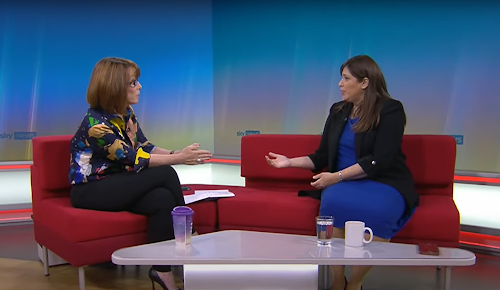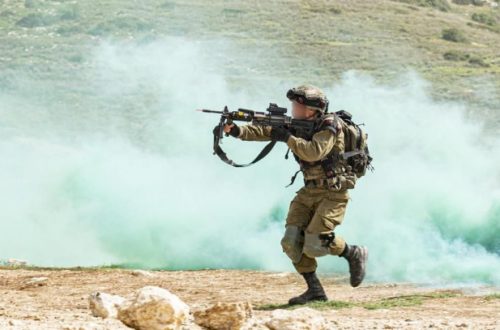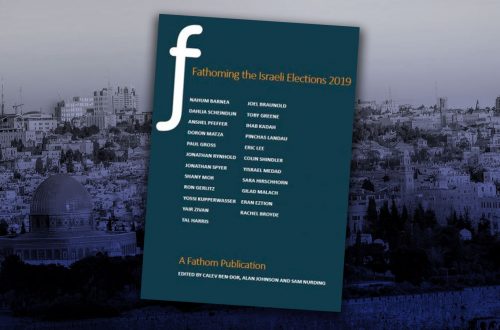This is a guest post by James Vaughan
In 1980, a group of Middle East experts within the British Foreign Office set themselves the task of analysing the proposition that Israel was a ‘strategic asset’ for the West. Perhaps unsurprisingly, they concluded that ‘in the absence of a general peace settlement Israel [could] be of very little value to the West, militarily or politically’[1] and that ‘the political arguments against involving Israel on the West’s side [were] overwhelming.’[2] Such conclusions may have reflected the opinions and interests of Britain’s network of embassies and consulates across the Arab world, but they ignored the lessons of a little known episode from seven years earlier.
40 years ago this week, on 6 October 1973, the armies of Egypt and Syria took advantage of the Day of Atonement, the holiest day of the year for the Jewish people, to launch a surprise attack against Israeli positions in Sinai and on the Golan Heights. Israeli historians have frequently viewed the outbreak of the Yom Kippur war, and the initial success of the Arab forces, as a classic example of intelligence failure (an ‘intelligence fiasco’ as Uri Bar-Joseph termed it in his 2005 book The Watchman Fell Asleep. The Surprise of Yom Kippur and its Sources). Less well known are some of the problems experienced by British intelligence agencies in the immediate aftermath of the war. Intriguingly, these were difficulties that stemmed directly from the policies adopted towards Israel by Edward Heath’s Conservative Government.
Despite Egypt and Syria’s early successes, by the time a ceasefire came into lasting effect on 25 October, it was clear that Israel had won another convincing victory. A consequence of that victory was that vast quantities of state-of-the-art Soviet weaponry had fallen into Israeli hands. The intelligence value both of the captured Russian arsenal and the tactical knowledge that Israeli forces had acquired in the process of defeating two modern, Soviet-equipped armies was obvious. Even before the shooting had stopped, Britain’s Secretary of State for Defence, Peter Carrington, admitted to being ‘disturbed’ at the success that Soviet-supplied SAM defence systems had enjoyed against the Israeli Air Force. On 18 October he asked the Chief of the Air Staff for a report on ‘the current capability of our own forces to cope with a similar threat in the European context.’[3] Shortly after the war, Edward Heath wrote to Carrington demanding an MOD response to reports that the balance between infantry and armour had been radically altered by the proven success of Russian infantry anti-tank weapons. ‘Do you think that any adjustments are required in British ordnance?’ a worried Prime Minister asked.[4]
Under political pressure to produce ‘intelligence appreciations, both technical and tactical’, the Director-General of Intelligence at the MOD, Vice Admiral Sir Louis Le Bailly, cabled the British Defence Attaché in Tel Aviv. Recalling instances of Anglo-Israeli intelligence sharing after the 1967 ‘Six Day War’, Le Bailly asked whether Israeli cooperation in ‘the mutual exploitation of Soviet equipment’ would be forthcoming.[5] A second telegram, sent by Le Bailly the following day to the Earl of Cromer, Britain’s Ambassador in Washington, revealed the answer. ‘You will be aware of our unpopularity in Israel,’ he noted, ‘so any crumbs you can glean from US sources will be most welcome.’[6] Complaining that ‘the political stance which the Government has taken has rendered it extremely unlikely that we shall get very much from the Israelis’[7], Le Bailly stressed the importance of close intelligence cooperation with the Americans. Even here, however, the MOD ran into obstacles. ‘Crumbs will be sent back as gleaned,’ Cromer assured him, but ‘we are somewhat inhibited by the present resentment of our failure to live up to US expectations of us during the crisis.’[8] Days later, the Embassy reported that although the Americans had admitted that an intelligence analysis of the war was being conducted, its subject matter was ‘too sensitive to Israel at this time to be released to the UK.’[9]
Le Bailly’s identification of the Conservative Government’s ‘political stance’ as the decisive problematic factor was well-judged. Several times during this period, he contrasted the situation with that which had prevailed after the 1967 Arab-Israeli war. Then, despite the fact that the Labour Government was officially committed to a Middle East arms embargo, Harold Wilson had ensured that clandestine British military supplies continued to reach the Israelis. Reports circulated about journalists being barred from the quay at Felixstowe while US Military Policemen stood on guard at arms dumps at the docks[10] and amateur plane-spotters were quick to note the arrivals and departures of unusual Israeli flights at bases like RAF Waddington in Lincolnshire.[11]
Such policies led to substantive contacts between the Israeli and British defence intelligence establishments after the 1967 war. In October 1967, the Admiralty argued that ‘it would be advantageous to the UK to initiate a scientific collaboration project by which we could watch at close quarters the Israeli development in the Naval field of Electronic Warfare.’[12] The following year, H.W. Pout (the MOD’s Assistant Chief Scientific Adviser) travelled to Israel and engaged in detailed discussions with the Israelis that went well beyond proposals for research into conventional armaments and included consultations about chemical and biological weapons.[13]
Regardless of what one thinks about the desirability of Anglo-Israeli military collaboration of this kind, no such opportunities for the Defence Intelligence Staff arose after the 1973 October War. This was a direct result of the embargo imposed upon arms supplies to Israel by Heath and his Foreign Secretary, Alec Douglas-Home. In his memoirs, Heath would claim that the arms embargo was ‘genuinely even-handed’ on the grounds that ‘in 1973 we had been providing arms to the Arabs and the Israelis in very similar quantities.’[14] This argument cut little ice with many British observers. Opposition quickly emerged on the government benches and John Gorst, the Conservative MP for Hendon North, memorably accused the Government of bowing down ‘to the oily blackmail of the Arab States’. When Sir Stephen McAdden, the long-serving MP for Southend East, tabled an Early Day Motion demanding that the Government continue to supply spare parts and ammunition to Israel, 25 Conservative MPs signed it within two days.[15]
The Labour Party, like the Conservatives, was divided into pro-Israel and pro-Arab factions, but David Owen later expressed the anger of the former camp with some passion:
I was appalled when the Foreign Secretary, Lord Home, and Prime Minister, Edward Heath, refused to supply, during the actual fighting, shells for the Centurion tanks that Israel had bought from us. I considered it then, and still do, the most cynical act of British foreign policy since Suez. It showed not just Arab influence within the Foreign Office but a total lack of principle in standing by one’s commitments from two politicians whom I had hitherto respected…. British influence with Israel never recovered, for perfectly understandable reasons…. It was a craven act which had everything to do with the threat of being cut off from Arab oil and for which I had nothing but contempt.’[16]
In his memoirs, Heath expressed satisfaction that his government’s policies during the 1973 war had led to Britain being ‘treated, along with France, as a “friendly” nation by Saudi Arabia, the main oil producer.’[17] The Foreign Office would no doubt have agreed. In November 1973, however, the MOD’s Defence Intelligence Staff, snubbed by the Israelis, cold-shouldered by the Americans and excluded from what Britain’s ‘Middle East War Aftermath Intelligence Coordinating Committee’ had identified as ‘potentially the greatest source of intelligence on Soviet equipment and tactical doctrine ever presented to the Western world’[18], might well have taken a rather different view.
[1] The National Archive, Kew, London [henceforward TNA], FCO 93/2569, Moberly minute, 12 May 1980.
[2] TNA, FCO 93/2569, FCO memorandum by the Near East and North Africa Department, 9 May 1980.
[3] TNA, DEFE 31/145, MO 27/2, Carrington to the Chief of the Air Staff, 18 October 1973.
[4] TNA, DEFE 31/145, Heath to Carrington, 29 October 1973
[5] TNA, DEFE 31/145, Signal 291800, Le Bailly to Col. Barrett (Defence Attaché, Tel Aviv), 29 October 1973.
[6] TNA, DEFE 31/145, Signal 301640, Le Bailly to Cromer, 30 October 1973.
[7] TNA, DEFE 31/145, Signal 011630, Le Bailly to Cromer, 1 November 1973.
[8] TNA, DEFE 31/145, Signal 311815, Cromer to Le Bailly, 31 October 1973
[9] TNA, DEFE 31/145, Signal 081930, Cromer to Le Bailly, 8 November 1973.
[10] TNA, PREM 13/1620, news agency extract for the Prime Minister, 5 June 1967.
[11] TNA, DEFE 13/851, Chief of Public Relations, MOD to PS/USofS (RAF), 17 November 1967.
[12] TNA, FCO 17/578, J.R.S. Guinness (Defence Supply Dept.) minute, 3 September 1968.
[13] TNA, FCO 17/578, Report on a Visit to Israel, 16-23 June 1968 by H.W. Pout, 8 July 1968.
[14] Edward Heath, The Course of My Life. The Autobiography of Edward Heath (London: Hodder & Stoughton, 1998), pp.500-1.
[15] Philip Norton, Conservative Dissidents: Dissent within the Parliamentary Conservative Party 1970-74 (London: Maurice Temple Smith Ltd, 1978), pp.139-141.
[16] David Owen, Time to Declare (London: Michael Joseph Ltd, 1991), p.209.
[17] Heath, The Course of My Life, p.501.
[18] TNA, DEFE 31/145, D DIS.25/2/2, Terms of Reference for The Middle East War Aftermath Intelligence Coordinating Committee (MEWAICC), 14 November 1973.


